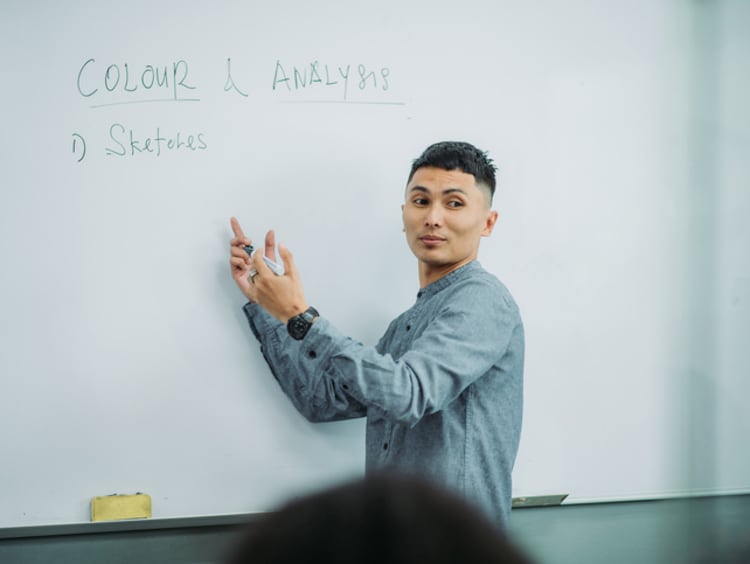Exploring Your Options for Careers in Higher Education

In a letter to Booker T. Washington, George Washington Carver once wrote, “Education is the key to unlock the golden door of freedom.”1 Indeed, education provides a pathway toward achieving your dreams and enabling you to make the world a better place for others. If you’re passionate about the potential of higher education, you may wish to take a look at some possible careers in higher education that you might pursue.
By pursuing higher education careers, you could make it your life’s work to empower the next generation of learners to achieve their own dreams. Or, you could work in higher education administration, or perhaps work closely with students within the student affairs departments. There is a wealth of possibilities to reflect upon as you think about the next chapter in your life.
Career Paths in Higher Education: Faculty Positions
When you think about the term “higher education careers” you may have immediately pictured a professor standing in front of a class and delivering a lecture. Becoming a postsecondary teacher can be a great choice if you’re highly knowledgeable and passionate about a particular subject area. Most faculty positions do require a doctoral degree, although some positions at community colleges may only require a master’s degree.
Not all postsecondary teachers hold the same title; there are differences of rank. Here’s a look at the possibilities:
- Adjunct instructor – An adjunct instructor teaches on a part-time, contractual basis. Instructors are often industry experts who teach one or two introductory or general courses in their field of expertise. If you already have extensive industry experience, you may want to pursue a position as an adjunct instructor so that you can know for certain whether a full-time career in academia is the right choice for you.
- Assistant professor – This is the first concrete step toward becoming a tenure-track professor. A doctoral degree is a requirement at universities, but might not be required at community colleges.
- Associate professor – An associate professorship is one step above an assistant professorship. Associate professors have more experience and may be on the tenure track.
- Professor – This is the senior-level title for professors, who are recognized as accomplished academicians with plenty of classroom experience. They either have tenure or are on the tenure track.
Higher Education Careers in Administration
Postsecondary administrators are responsible for overseeing the daily operations, programs, academics, faculty research and student services at a university or college. Their specific duties depend on their department. At a smaller school, one administrator may oversee multiple, similar areas of functioning, whereas a larger school is more likely to have one administrator in charge of each area.
There are numerous higher education careers to choose from within the postsecondary school administration subfield. Consider the following options:
Director of Alumni Relations
A school’s alumni are a crucial part of the learning community. Former students often contribute to the active learning community, such as by making themselves available for job shadowing opportunities or mentorship. Furthermore, schools typically continue to offer support services to former students long after their graduation, such as by providing networking opportunities and career assistance.
The director of alumni relations is responsible for developing, implementing and overseeing all of the school programs that relate to its alumni community. They perform outreach services and conduct event planning (e.g. class reunions), and they may work on fundraising initiatives.
Chief Academic Officer
The chief academic officer is in charge of the school’s academic programs. They establish academic standards, develop curricula and coordinate academic offerings with faculty. They must also ensure that all of the programs and standards are in full compliance with all applicable state and federal regulations.
In short, a chief academic officer’s primary goal is to ensure that the school is providing high-quality education to students. These professionals look for ways of enhancing student success, improving graduation rates and boosting student retention.
President
The president of a college or university is much like a CEO at a corporation. They are the senior-most official who is in charge of overseeing all administrative and academic departments and operations. A typical university president has a rather long list of duties. The following is a small sampling:
- Oversee the establishment and enforcement of school policies
- Oversee spending and budgeting
- Supervise administrative staff and faculty
- Evaluate student success
- Consult on curricula recommendations
Development Officer
No postsecondary education institution can function properly without a development officer. These professionals are responsible for fundraising. A school’s funding doesn’t come entirely from tuition dollars; a sizable portion of it comes from endowments and fundraising initiatives.
A school or university development officer is responsible for:
- Establishing fundraising benchmarks and ensuring they are met or exceeded
- Developing, implementing and overseeing fundraising strategies and campaigns
- Identifying and liaising with potential donors, encouraging them to give donations
- Curating relationships with major donors
- Encouraging planned giving initiatives, such as by showing major donors the value of making bequeaths in a will or gifting stocks and bonds
- Writing grant proposals
Higher Education Positions Within Student Affairs
If you like the thought of working in postsecondary administration, but you would prefer to work more closely with students, then you may want to consider a student affairs position. Student affairs, or student services, encompasses all of the functional areas that impact students’ academic, athletic and personal development. For example, it includes student advising, financial aid, class enrollment, athletics and admissions. Here are some positions within student affairs:
Dean of Student Affairs
The dean of student affairs is responsible for developing, implementing, overseeing and assessing the nonacademic programs at the school. These are the programs that are intended to provide enrichment opportunities to students and to enhance campus life. The dean of student affairs might work on diversity and inclusion programs, for example, and on programs aimed at supporting residence life and athletics.
These professionals might plan and direct the orientation programs for new arrivals on campus. They might determine that the school needs to offer more counseling services to support the students’ well-being. A dean of student affairs might also work on student housing initiatives.
Athletics Director
If you’re passionate about sports and physical fitness, as well as higher education, you might consider pursuing a career as an athletics director. The athletics director is typically the senior-most professional in charge of overseeing the entire athletics department. They develop, implement and oversee programs, policies and initiatives related to the school’s sports teams, as well as its intramural teams and the fitness activities and facilities that are open to all students.
An athletics director has a lot of responsibility. They must typically do the following tasks:
- Stay on top of all of the latest regulatory changes regarding collegiate sports, as well as conference rule changes, and ensure that the university remains in compliance
- Develop and monitor the athletics budget and oversee the purchase of new athletics equipment
- Plan and oversee the athletics department’s fundraising initiatives
- Develop and supervise event planning, namely sporting events
- Oversee the pricing and distribution of tickets
- Supervise the athletics department’s marketing initiatives and recruitment efforts
Admissions Officer
The admissions officer or director is in charge of the admissions department. They are responsible for developing the admissions objectives. For example, at a highly selective university, the admissions objectives might include the recruitment and admission of students who are extremely academically competitive.
The admissions officer develops the school’s strategic recruitment plans and ensures that the enrollment targets are met. They work on the school’s marketing campaigns, supervise the application process and oversee the student interview process. Admissions officers make the final decisions regarding which students will be admitted to the school.
Registrar
The registrar’s office is responsible for ensuring the accuracy and integrity of each student’s academic record. A registrar will help students register for classes, update student records and ensure that students are on track for graduation, with all of the necessary credits and requirements for their major.
The registrar will also determine which students qualify for academic awards, such as the dean’s list. These professionals also provide enrollment verification for scholarships, determine transfer credits, fulfill transcript requests and clear students for graduation.
Earn Your Higher Education Degree
If any of the above careers in higher education appeal to you, your next step is to enroll in a graduate program. If you wish to pursue a career in administration or student affairs, you might only need a master’s degree (although some senior-level positions at some schools might demand a doctoral degree). A faculty position generally requires a doctoral degree, although some aspiring community college instructors might only need a master’s degree.
The higher education degree you should select depends on your specific career goals. If you do need a doctoral degree, you could select a Doctor of Education (EdD) in Teaching and Learning with an Emphasis in Adult Learning degree.
Alternatively, you may choose a Doctor of Philosophy (PhD) degree in your chosen subject area with an emphasis in education at the postsecondary level. Similarly, if you are an aspiring community college faculty member, you could choose a master’s degree in your subject area with an emphasis in education.
On the other hand, if you prefer to pursue a position in administration or student affairs, you might look for a Master of Arts in Higher Education Student Affairs degree. For top-level positions within administration, you may need an EdD, such as a Doctor of Education in Teaching and Learning: Adult Learning degree. If you’re unsure of which degree best fits your career goals, it’s a good idea to contact the school and ask for guidance.
If you feel called to serve others in the higher education field, you can earn your higher education degree at Grand Canyon University. We offer numerous master’s degrees in education that can empower you to pursue your dream career. These include the Master of Arts in Higher Education Student Affairs, which prepares students to serve as ethical servant leaders and positive influences within the learning community.
To take your education and career even further, consider exploring one of our higher education doctoral degrees.
1Retrieved from Schmoop, Quotes in November 2022.
Approved by the Assistant Dean for the College of Education on Jan. 11, 2023.
The views and opinions expressed in this article are those of the author’s and do not necessarily reflect the official policy or position of Grand Canyon University. Any sources cited were accurate as of the publish date.


